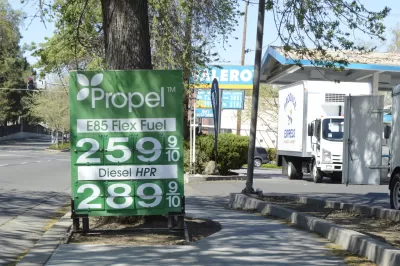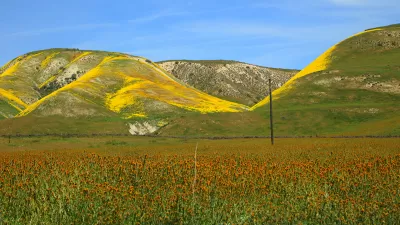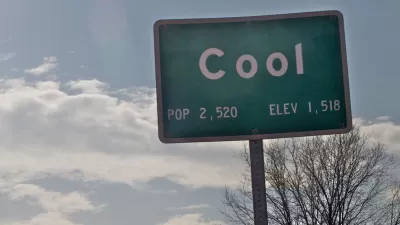For almost two years, MUNI's diesel-powered buses in San Francisco have run entirely on renewable diesel fuel. Diesel-powered Amtrak trains running from San Jose to Sacramento could be next.

"On Aug. 28, a train between Oakland and Auburn [Placer County, Calif.] began running entirely on the fuel from Golden Gate Petroleum of Martinez — part of a test that, if successful, could herald its use throughout the Capitol Corridor system and in trains statewide," reports Isha Salian for the San Francisco Chronicle.
Planetizen reported on Dec. 14, 2015 that all San Francisco-owned vehicles running on diesel fuel, including its Muni bus fleet, transitioned from a biodiesel blend to 100 percent renewable diesel. Salian adds that Oakland and the San Jose Unified School District have also phased in renewable diesel, "and operators of San Francisco Bay ferries are looking at it too."
The Bay Area is rapidly becoming a center for renewable diesel, which can be made from vegetable oils, restaurants' oil waste or animal fats — material known in the industry as biomass. Unlike biodiesel, which has to be mixed in with petroleum diesel, the new fuel can go into a tank at 100 percent strength.
Demand for the product in California largely stems from the establishment of the Low Carbon Fuels Standards program by the California Air Resources Board, part of the Global Warming Solutions Act of 2006, signed by Gov. Arnold Schwarzenegger. His 2007 executive order (pdf) also established a statewide goal to reduce the carbon intensity of California's transportation fuels by at least 10 percent by 2020.
Gov. Jerry Brown's Executive Order B-30-15 included a goal of reducing (fossil) petroleum consumption 50 percent by 2030, furthering the push toward biofuels.
Demand skyrocketed from 2011 to 2016, from 2 million gallons to 250 million gallons used last year. According to CARB, this is about 7 percent of all diesel used in the state, writes Salian.
'We can sell every drop of renewable diesel we make,' said Eric Bowen, head of corporate business development for the Renewable Energy Group. The company sells the fuel mostly to the California market, he said. Its Louisiana plant can produce 75 million gallons of renewable diesel each year, and it is looking to expand its facilities.
According to an email from Tom Fulks of the Diesel Technology Forum, Gold Gate Petroleum purchases renewable diesel from Iowa-based Renewable Energy Group or Finland-based Neste, the world's largest producer, which they sell under their Neste MY Renewable Diesel brand.
"Simon Mui, senior scientist at the Natural Resources Defense Council (NRDC), said that depending on what the renewable diesel is made from, it can cut lifecycle greenhouse gas emissions by 15 to 80 percent," adds Salian. "Renewable diesel also reduces fine particle pollution and other types of emissions, like nitrogen oxides and carbon monoxide, Mui said."
Challenges
Some experts question how much the renewable diesel market can grow.
'The more we study biofuels, the less clear it is there's very much of a sustainable supply,' said Daniel Kammen, a UC Berkeley professor who helped write California's Low Carbon Fuel Standard. Biofuels are always less efficient than electric vehicles, he said.
While electrifying public transit buses has made enormous progress lately, heavy trucks will still be a challenge.
Sam Wade, chief of the transportation fuels branch at the Air Resources Board, said that while heavy-duty vehicles may eventually switch to electric power, 'there's not that many applications that are fully viable today. We see (renewable diesel) as a nice near-term opportunity.'
'We don't meet our state goals unless we have a full array of those electrified fleets as well as liquid-fuel-based fleets,' adds Mui of NRDC.
Next step for Capitol Corridor
If further tests go well, all Capitol Corridor trains could switch over to renewable diesel by next summer, according to Dean Shepherd, manager of mechanical services.
Jim Allison, manager of planning, Capitol Corridor, estimates that shifting to renewable diesel in all of its locomotives, which each need about 70 gallons of fuel per hour, would reduce the trains' greenhouse gas emissions by two-thirds.
For in-depth information on renewable diesel, see this 2010 evaluation of renewable diesel by UC Berkeley, UC Davis and the California Environmental Protection Agency.
FULL STORY: Renewable diesel use in California moves to fast track

Planetizen Federal Action Tracker
A weekly monitor of how Trump’s orders and actions are impacting planners and planning in America.

Map: Where Senate Republicans Want to Sell Your Public Lands
For public land advocates, the Senate Republicans’ proposal to sell millions of acres of public land in the West is “the biggest fight of their careers.”

Restaurant Patios Were a Pandemic Win — Why Were They so Hard to Keep?
Social distancing requirements and changes in travel patterns prompted cities to pilot new uses for street and sidewalk space. Then it got complicated.

Platform Pilsner: Vancouver Transit Agency Releases... a Beer?
TransLink will receive a portion of every sale of the four-pack.

Toronto Weighs Cheaper Transit, Parking Hikes for Major Events
Special event rates would take effect during large festivals, sports games and concerts to ‘discourage driving, manage congestion and free up space for transit.”

Berlin to Consider Car-Free Zone Larger Than Manhattan
The area bound by the 22-mile Ringbahn would still allow 12 uses of a private automobile per year per person, and several other exemptions.
Urban Design for Planners 1: Software Tools
This six-course series explores essential urban design concepts using open source software and equips planners with the tools they need to participate fully in the urban design process.
Planning for Universal Design
Learn the tools for implementing Universal Design in planning regulations.
Heyer Gruel & Associates PA
JM Goldson LLC
Custer County Colorado
City of Camden Redevelopment Agency
City of Astoria
Transportation Research & Education Center (TREC) at Portland State University
Camden Redevelopment Agency
City of Claremont
Municipality of Princeton (NJ)





























